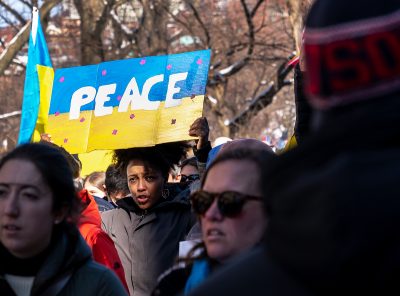
Following years of tension, Russian military forces invaded Ukraine on Feb. 24, an attack that has impacted millions of people both within and far beyond the country’s borders.
In a Thursday speech, Russian President Vladimir Putin said he intended to “denazify” Ukraine moments before Russia invaded the country. What followed was a series of repeated airstrikes across major Ukrainian cities, forcing residents to take shelter in bunkers, subway stations and flee to neighboring countries like Poland and Moldova.
The invasion has also impacted the BU community, which is made up of many students, parents and faculty with close ties to Ukraine or Russia.
Oksana Oliinyk, a member of the Boston University Parents United Facebook group, has lived in Kyiv her whole life along with her family. She awoke last Thursday in the early hours of the morning to the sounds of bombs, she wrote in a Feb. 26 email.
“Every day, and especially at night, we hear the sounds of falling bombs, planes and helicopters circling in the sky,” Oliinyk wrote. “We try to be calm and inspire confidence in others. We keep in touch with all our friends.”
Oliinyk decided to stay in Kyiv and gather her husband, parents and brother, as well as her two-year-old niece, Masha, under one roof, she wrote. She said she cannot comprehend how something like this has happened in the 21st century.
“A whole life has passed in those three days,” Oliinyk wrote at the time.
Her son, Andriy Kolenov, a freshman in the College of Arts and Sciences, said he left Kyiv for the first time to attend Boston University, adding it was not easy for him to “sit there and do nothing” as his home was being invaded.
“I have memories from nearly every single street in the city and my childhood and teenage years passed by in Kyiv,” Kolenvo said. “This is the only city which really feels, to me, like home.”
From Boston Common to Harvard Square, people have been forming peaceful marches across Massachusetts in support of Ukraine.
Members of the Russian Speaking Society contacted Kolenov about a demonstration that took place at Boston Common on Feb. 27, which led to him getting involved in subsequent protests.
“Even if it’s ultimately not going to change Vladimir Putin’s thought process or anything in the world, at least we hope to convince Boston University and Northeastern [University] and Boston in general that…we all stand with Ukraine,” Kolenov said.
Svitlana Malykhina, coordinator of BU’s Russian Language Program, also grew up in Ukraine but, because her mother is Russian, she spoke both languages fluently.
She said the recent invasion was “heartbreaking.”
“I can not shake off the feeling of horror,” Malykhina said. “I wouldn’t say I’ve seen this coming, even though I followed the media…but I’ve never, ever could have thought that military operation would be that massive.”
Russia-Ukraine tensions date as far back as 2014 when Russia annexed the Crimean Peninsula from Ukraine. Since then, the two countries have been on edge with Putin gradually increasing the number of forces on the Ukrainian border prior to the full-scale invasion.
Putin denied any intention to invade Ukraine until late February, only insisting that Ukraine not join the ranks of NATO.
Country representatives have been engaged in peace talks over the past week. Ukraine’s Foreign Minister said the country would not accept any Russian “ultimatums.”
Alexander Girichev, a junior in the Questrom School of Business who was born in Moscow, Russia, said he empathizes with Ukrainians.
“A significant portion of Russians don’t realize how serious the situation is,” Girichev said. “We all stand against what is happening right now and we want to deliver this message to the rest of our world.”
Both Girichev and Malykhina said hate should not be directed towards Russian people, noting it is the country’s government making the decisions, not its citizens.
“The war was decided by politicians, which make decisions for the whole nation, but the whole nation does not represent our politicians or our government,” Girichev said. “We didn’t choose our government.”
BU Global House will host a community conversation in support of Ukraine this Friday from 2:30 to 4 p.m. at 610 Beacon St. The event invites everyone in the BU community to share their perspectives and learn from others about the war in Ukraine, Malykhina said.
“I have relatives in every city that is being bombed now,” Malykhina said. “War is the worst thing that could have happened and I really want it to stop.”























































































































Karen Thomas • Mar 17, 2022 at 6:43 pm
I feel bad for every Russian soldier in this war that is killing their own people over Putin’s lies! Every soldier that dies is dying, because of a lie! Every Ukrainian that dies is dying, because of a lie!! Putin cares about no one, but himself and his power!! This is a sad senseless war and Putin has nothing but Blood on his hands that he will have to give account for to God Almighty!! Look what he’s done to innocent people and to his country! What good does having power over people when they don’t even respect you?
Lois Deneau • Mar 3, 2022 at 6:49 pm
Awesome and meaningful